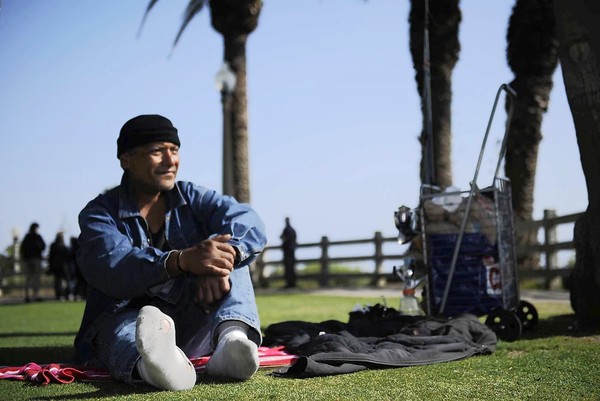L.A. to Focus Homeless Services
-
(Client: Home For Good)

A man at Palisades Park in Santa Monica is among an estimated 48,000 people… (Mariah Tauger / Los Angeles Times)
Supervisors agree to have county departments look at ways to increase permanent supportive housing and provide services that emphasize treatment for drug and mental health problems.
By Alexandra Zavis, Los Angeles Times
Los Angeles County supervisors agreed Tuesday to give priority to the most hard-core street dwellers when allocating housing and other homeless services.
“These are the people who need help the most,” said Supervisor Zev Yaroslavsky, who proposed the motion with Supervisor Mark Ridley-Thomas. “They are the ones who have been on the streets the longest amount of time…. [They] are the most in danger of getting sick and dying on the streets.”
The proposal, adopted unanimously, is part of a plan recommended by business leaders that aims within five years to put a permanent roof over the heads of all homeless veterans and the chronically homeless by making more efficient use of existing resources.
Wendy Levin, a member of the Los Angeles Business Leaders Task Force on Homelessness, said Tuesday’s motion takes an “essential and bold step forward.”
The group’s plan, called “Home for Good,” proposes reallocating about $230 million in federal, state and local resources each year to pay for a rapid increase in permanent supportive housing, which includes counseling and treatment, for the most persistent street dwellers.
Although the chronically homeless make up just a quarter of the estimated 48,000 people who are homeless on any given night in Los Angeles County, they use a disproportionate share of services, including hospital emergency rooms and jails.
By focusing on housing these individuals, the plan’s authors argue, the county will free up resources for other homeless populations, such as families and youth.
In December, the Board of Supervisors instructed county Chief Executive William T Fujioka to review the plan with county departments. His recommendations were included in the motion approved Tuesday. They include developing strategies to increase the number of available housing vouchers, ensure that services are available to those who are housed, coordinate with other public and private providers and make the most of available funding.
“There was concern expressed regarding the current economic climate,” Fujioka said in his report to the board. “It is our belief, however, that it is the perfect time to work smarter, implement meaningful improvements and to develop strategies that are more efficient and that target our most costly consumers.”
The plan reflects a growing consensus among homeless advocates that those who have lived on the streets the longest are more likely to accept counseling and treatment if they don’t have to worry about where they will sleep that night. But this housing-first approach has been controversial politically.
Supervisor Michael D. Antonovich has complained about spending tax dollars to house individuals who continue to abuse drugs and avoid treatment, calling the approach “warehousing without healing.” He proposed an amendment Tuesday — approved without objection — that requires services for those who are housed to emphasize treatment for substance abuse and mental health problems.
